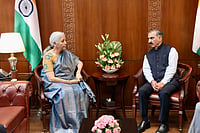A recent study on the level of awareness of medical termination of pregnancy has claimed that one of every three women it interviewed did not consider abortion as a health right or were unsure of it.
The survey by the NGO Foundation for Reproductive Health Services India (FRHS India) also claimed 32 per cent of respondents were unaware of abortion as a legal right and that 95.5 per cent of Indian women were uninformed of the existence of the Medical Termination of Pregnancy (Amendment) Act, 2021.
FRHS India, which provides clinical family planning services in the country, recently released the findings of its study on the level of awareness of the MTP Act and practices related to safe abortion. The study was conducted by the FRHS in Delhi, Maharashtra, Rajasthan and Uttar Pradesh.
"The Medical Termination of Pregnancy Act was modified 1.5 years ago but abortion-seekers are still unaware of the changes brought about in the Act. We found that even service providers (doctors) in Rajasthan were unclear about the shift in the gestational age from 20 to 24 weeks," Debanjana Choudhuri, primary researcher and director of programmes and partnerships at FRHS India, said.
Even after five decades, approximately 95.5 per cent of Indian women are uninformed of the existence of the MTP Act, which gives access to safe abortion services, Choudhuri claimed.
The study said it is "worrying" that 99 per cent of women in India did not know the laws have changed. "Also, the MTP Act 1971 amendment is unknown to 95 per cent of frontline healthcare providers (FLWs) or ASHA workers who are the initial point of contact for women," Choudhuri claimed.
According to the report, in a number of states, a majority of frontline healthcare providers were even unaware that the Act has been amended. Frontline healthcare workers were also unaware of the upper limit of pregnancy up to which MTP is legal in India, it claimed.
Ashutosh Kaushik, chief executive officer of FRHS India, said, "The MTP Act amendment allows greater autonomy to women but lack of awareness among abortion seekers and healthcare service providers is causing a hindrance in bringing the needed change. Abortion is a basic human right, and FRHS strongly believes in 'children by choice, not chance'. For this to be successful, the government needs to deploy mass awareness activities in urban and rural areas."
The study claimed that 99 per cent of women in India did not know the laws that allow abortion up to 24 weeks 'for special categories of women', up from the existing 20-week gestation period. Less than one-third of women in every state but Uttar Pradesh (43 per cent) had ever seen, read, or heard a message about a safe abortion, it added. According to 56 per cent of married women and 36 per cent of single women, religious views influence one's decision to use MTP services, the study said.
It said more than two-thirds of married women look to frontline health workers as the main source of information for pregnancies or abortions. Around 50 per cent of unmarried women mostly rely on social media, while nearly 33 per cent rely on teachers as the key source of information.
FRHS India recommended creating awareness, sensitisation, and capacity-building efforts at the district and sub-district levels among abortion seekers and healthcare service providers. It can be achieved by introducing the public to the amendment through numerous seminars and orientations, it said. Also, a multifaceted strategy can be used that includes the engagement of community and religious leaders to reduce the obstacles to access the services, the study said.


























